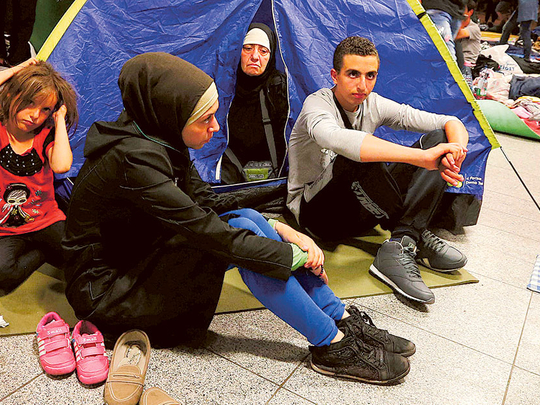
KECSKEMIT, Hungary: Four defendants appeared in court in Hungary on Saturday over Austria’s migrant truck tragedy, as a “horrified and heart-broken” UN chief called for concerted action to end Europe’s refugee crisis.
Police believe the three Bulgarians and one Afghan held over the 71 deaths to be low-ranking members of one of the numerous human trafficking gangs that many of the tens of thousands of migrants coming to Europe pay for help.
Reacting to the gruesome Austrian find and a new Mediterranean shipwreck, UN Secretary General Ban Ki-moon said Friday the migrant crisis is a “human tragedy that requires a determined collective political response.”
“I appeal to all governments involved to provide comprehensive responses, expand safe and legal channels of migration and act with humanity, compassion and in accordance with their international obligations.”
The abandoned truck, found Thursday on an Austrian motorway in the baking sun near the Hungary border, contained the tightly packed, decomposing bodies of 59 men, eight women and four children including a little girl. They were thought to be Syrians.
Sparking revulsion across Europe, the tragic discovery highlighted the dangers faced by people fleeing conflict and hardship in the Middle East and Africa even once they reach Europe, with many putting their fate in the hands of profit-hungry people smugglers.
It came as yet another boat crammed with desperate migrants sank in the Mediterranean off Libya.
The coastguard hiked Saturday the death toll to 111 but said that “dozens” were still missing. A total of 198 among the 400 on board have been rescued.
The United Nations estimates 300,000 people have fled conflict and hardship in the Middle East and Africa for a better life in Europe this year, and 2,500 more have died in the attempt, mostly in the Mediterranean.
“My little sister, someone climbed on her back and pushed her down. When I saw her for the last time, she was underwater with him on top of her,” Pakistani Shefaz Hamza, 17, a survivor who also lost his mother in the latest tragedy, told AFP in Libya.
In Hungary, the four men including the truck’s alleged owner and drivers arrived Saturday afternoon at the court in Kecskemet, some 100 kilometres (60 miles) north of the Serbian border that some 140,000 have crossed this year.
Prosecutors said they wanted the four remanded in custody for a month due to the “exceptional nature of the crime, the subsequent deaths of the smuggled persons and the perpetration of the criminal act of people-smuggling in a businesslike manner.”
The four suspects — two of them appearing to be in their 30s and the others around 50 — were in separate police cars that swooped in a convoy into the courtyard. They were led inside in handcuffs.
The discovery in Austria was a rare occurrence on land in a prosperous country when so many migrants have died at sea. Police said the people may have been dead for up to two days.
Austrian daily Oesterreich calculated Saturday that the 71 were crammed into 15 square metres (160 square feet) and would have asphyxiated in 63 minutes once they were shut inside the refrigerated truck with no air, the children suffocating first.
Austrian motorway maintenance workers alerted police after noticing “decomposing body fluids” dripping from the truck. TV images showed flies buzzing around the back of the vehicle.
German Chancellor Angela Merkel, appealing together with Austrian Chancellor Werner Faymann for a swift reform of European rules to share out migrants more fairly among the 28-strong EU, called it a “warning” to Europe.
Faymann said Friday that EU subsidies to EU members that oppose such a move — which include eastern members of the bloc and Britain — should potentially be cut “to increase the political pressure”.
An AFP reporter on the Greece-Macedonia border said migrants were continuing Saturday to cross in groups of 50, following the more than 100,000 to have trekked through the western Balkans this year, many bound for EU member Hungary.
“We estimate that some 1,500 people are able to cross the Greek border into Macedonia each day, though of course the situation changes every day,” said UN refugee agency spokeswoman Stella Nanou.
One of them, Ali Younes, a 65-year-old from Baghdad, sold his home in Baghdad to pay a smuggler to reach Turkey through Syria. He risked his life in an inflatable boat to reach the Greek island of Samos from Turkey.
“I lived through everything: the Iran-Iraq war, the invasion of Kuwait, the sanctions period, the US occupation, the sectarian war, and now Daesh,” he told AFP, referring to the Islamic State group that has seized large swathes of Iraq since last year.
In Germany, meanwhile, which expects to absorb 800,000 asylum seekers this year, a demonstration to show solidarity with refugees was planned in the eastern city of Dresden on Saturday.
The nearby town of Heidenau, which has become a flashpoint for anti-migrant protests, was calm overnight.
Interior Minister Thomas de Maiziere said in the Sueddeutsche Zeitung daily he was “proud that Germany is an open and tolerant country”.
—AFP












